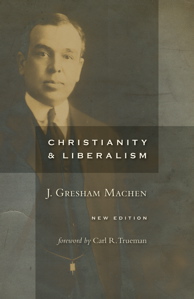J. Gresham Machen’s classic, Christianity and Liberalism, was one of the most influential books of its time when it was first published in 1923. Many consider it to be a challenge to theological liberalism that was never answered by liberals. Machen’s clarity and conviction have made his dissection of sentimentalized liberalism a must read, even a century later. In the new edition (Eerdmans, 2009), the present academic dean at Machen’s Westminster Theological Seminary, Carl Trueman, writes a foreword that reminds us of the enduring value of this important work. Trueman, who is always spot-on with his critiques, aptly diagnoses the need for a rereading of Machen:
This [Machen’s critique of sentimentalized religion] is perhaps where Machen still speaks most obviously to our own times. While some would claim that sentimentalism has been trumped by postmodern cynicism, it is arguable that such is not the case. The saccharine schmaltz that fills many light entertainment programs is a stable of popular culture; commercials that play on romanticized notions of family, even if they add a hint of irony here and there, are still meant to pull at the heart strings and resonate with something deep inside the audience that encourages us to buy into the dream. And all the talk that comes from some circles about Christianity’s not being a set of beliefs but a way of life, that we should not believe in Jesus but follow him, seems to arise out of a view of Christianity as sentiment, and even to bear uncanny linguistic resemblance to precisely the kind of nineteenth-century liberalism against which Forsyth, Barth and Machen railed with such passion and persistence.
Further, one has only to open a typical book of contemporary praise songs or listen to a sermon by a typical televangelist to see how the values of the world pervade the liturgics and the homiletics of contemporary church life. One might also mention the many pop-evangelical preachers for whom Christianity and the interests of a particular nation or a particular political ideology are one and the same. Again, this jingoism is just another kind of sentimentalism, and it is alive and well today as it was in the days when Machen wrote his little book (xiii-xiv).
Trueman’s words are directed at all the sentimentalizing of Christianity, something fundamentalists and evangelicals would be wise to heed. Any attempt to tug at the heart strings through styles of music or preaching flirts dangerously close to the heart of liberalism. This is not to deny the genuine place of emotion, but emotion should always be tied directly to a faithful exposition of the Word and a clear proclamation of sound doctrine. Too many preachers, evangelists and church planters are still getting a heavy dose of sentimentalism in their training. They learn a certain style of oration that borders on and wanders into the exploitation of a congregation’s emotions, tricks any huckster learns early on. Paul decried this methodology in 1 Corinthians 1:17-2:5 where he rejected the oratorical manipulations of the Sophists of his day, lest the message be obscured by the medium.
Fundamentalism and evangelicalism need the robust kind of thinking exemplified in Christianity and Liberalism more than ever before. The reforms of fundamentalism that seemed to have been swelling in the 1990’s have all but died, as many ministries have re-entrenched into a new traditionalism. Sentimentalism seems to be on the rise again in response to the uncertainty of the times, especially since the 2008 election. If fundamentalists and evangelicals are not careful, they will drift closer to a new old liberalism that is only apparently different from that of Machen’s day. And then those who think they are the furthest from liberals will find themselves bearing a remarkable resemblance to them. Trueman concludes:
Thus the world of today is perhaps not so different from that faced by Forsyth, Barth, and Machen. Human beings still try to make God in their own image, still project their own values onto the divine, and still operate as theologians of glory, to use Luther’s famous term from his Heidelberg Disputation.
Yet in closing this introduction, I must mark one significant difference between the argument of Machen and the arguments of Forsyth and Barth: for Machen, the only consistent way to oppose sentimentalism in religion was to maintain the truth of Christianity as an historical religion; and that could be done only on the basis of a Bible that was authoritative because it was divinely, verbally inspired. Anything less made Christianity uncertain, and Christian theology little more than those bits of the Bible’s teaching with which the individual feels comfortable. A matter, indeed, of taste and sentiment.
On this point he offers a fundamentally different approach to Christianity from that found in Forsyth and Barth, and the significance of this cannot be overestimated, particularly in the current context where a revival of evangelical appropriation of Barth’s theology is seen by many as offering prophetic possibilities for the church—possibilities that, if Machen is right, will ultimately prove at best inadequate for the task of truly confronting the world’s wisdom and at worst an idiom for the very expression of such (xiv-xv).

0 Comments